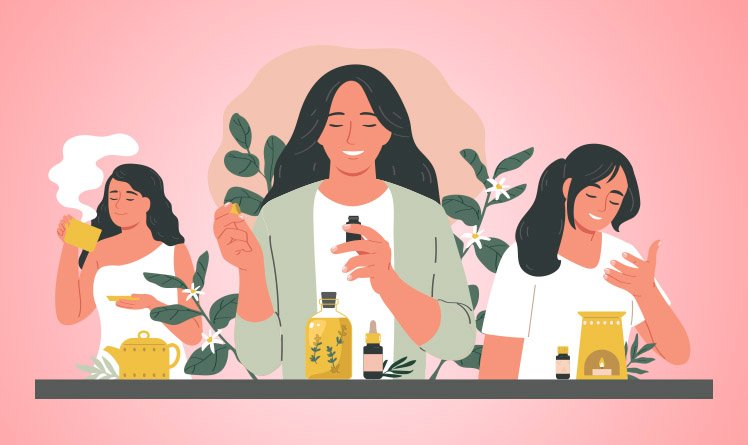Essential Oils: What are they, what are they for and how do they redirect your mental state?

|
Getting your Trinity Audio player ready...
|
Have you ever caught yourself smelling a perfume and suddenly felt an old memory come flooding back as if it happened yesterday? Or felt instant calm when you inhaled the scent of lavender? It's not magic—it's science. And that's where essential oils come in. These powerful drops are more than just pleasant fragrances; they have the potential to redirect your mental state, improve your mood, bring focus, and even aid in practices like... mindfulness and Neuro-Linguistic Programming (NLP).
In this article, we'll delve into the world of essential oils, understanding what they are, what they're used for, and how they can transform your emotional and mental life. The idea here isn't just to provide information, but to open space for an experience: one that begins with the sense of smell and reverberates throughout the body, mind, and soul. Ready for this sensory journey?
What are essential oils?
The origin of essential oils
Essential oils are highly concentrated natural compounds extracted from plants, flowers, bark, roots, seeds, and leaves. They carry the "essence" of the plant—its most potent chemical and aromatic properties. In other words, it's as if we've placed the heart of the plant inside a small bottle.
These oils have been used for millennia in different cultures—from the Egyptians to the Chinese—as tools for healing, spiritual rituals, and body and mind care.
How they are extracted and why it matters
The most common method of extraction is steam distillation, but methods such as cold pressing and solvent extraction also exist. But why is this important? Because the method directly influences the oil's purity and efficacy. Therefore, poorly extracted oil may contain toxins or lose some of its therapeutic properties.
If you're looking for oils for emotional or mental health, purity is essential. Think of them as functional brain foods—the more natural, the better the impact.
What are essential oils for?
Therapeutic and emotional uses
“Essential oils are used to treat the body, mind and emotions through smell, skin and breathing.”
On an emotional level, they help reduce anxiety, improve mood, increase focus, and bring more mental clarity. Imagine having a kind of emotional "reset button"—that's more or less what certain essences provide.
Physical and mental benefits
On a physical level, oils can help relieve muscle pain, insomnia, respiratory problems, and more. On a mental level, many can help alleviate racing thoughts, insomnia due to rumination and even creative blocks.
Balance between body and mind is the path to high performance. And along this path, oils act as a kind of emotional fuel, capable of adjusting your internal gear—slowing down or speeding up as the moment demands.
The connection between aromas and mental state
How Smells Affect the Brain
Have you ever noticed how certain scents have the power to change your mood in seconds? This is because smell is the only one of the five senses that has a direct connection to the emotional brain—more precisely, the limbic system, the area that regulates emotions, memory and unconscious behaviors.
When you inhale an essential oil, the aromatic molecules travel quickly through your nose to your olfactory bulb, which sends signals to your limbic system. Within seconds, your brain begins to react: cortisol can go down, dopamine can go up, and that anxiety-ridden state of mind can start to dissipate like smoke.
This isn't guesswork — it's neuroscience.
“Essential oils directly affect the limbic system, modulating emotions and mental states in a matter of seconds.”
And that makes all the difference when we talk about mental reprogramming, focus and well-being.
The limbic system and emotions
The limbic system is like the conductor of our emotions. In this sense, it regulates from fear to joy, passing through sensations like security, love, and connection. When you associate a scent with a positive experience, you create a powerful olfactory memory.
For example, if you always use lavender during your meditation, over time, the mere smell of lavender will begin to induce a state of calm, even outside of your meditation practice. This is what we call emotional conditioning—a technique widely used in NLP and contemporary aromatherapy.
Essential oils in the practice of mindfulness
How to integrate aromas into meditation
Mindfulness It's about being present. It's that simple. But we know that staying focused on the present isn't so easy, especially when your mind is busy. The good news? Essential oils can be incredible allies in this process.
When you apply an oil to a diffuser, your hands, or even your temples before meditating, you create a sensory ritual. This sends a clear message to your brain: "Now it's time to slow down." This way, your breathing deepens, your body relaxes, and your mind begins to quiet down.
“Integrating essential oils into mindfulness practice enhances the state of presence by stimulating the olfactory system, promoting focus, relaxation, and connection with the present moment.”
Aromatherapy as a sensory anchor
In NLP, we use anchors to retrieve specific emotional states. And smell is one of the most powerful anchors there is. Why? Because the brain doesn't "argue" with a smell—it reacts automatically.
You can choose an oil for each intention: lavender for relaxation, rosemary for concentration, sweet orange for uplifting mood. Thus, combining these aromas with mindful breathing practices creates emotional shortcuts. Over time, the scent alone is enough to enter the desired state. Simple and effective.
NLP and Essential Oils: A Powerful Alliance
Olfactory anchoring techniques
Anchoring is a classic NLP technique. And, as we've said, scents make perfect anchors. To create your own, just follow three steps:
- Choose the emotional state you want to access (e.g., confidence).
- Enter this state intensely—use memories, music, postures, whatever is necessary.
- At the height of emotion, apply a little essential oil to your wrist or inhale it directly.
Repeat this process for a few days and voila: You've created an olfactory anchor. Now, whenever you need reassurance, that scent will be there to activate your desired state.
Creating positive triggers with scents
In a busy life, small triggers make a big difference. Imagine starting your day with a scent that energizes you, or using an essential oil before an important meeting to reduce tension.
This is a clever way to "hack" your emotional system and redirect your mental state. Instead of fighting negative thoughts, you teach your body and mind to access more productive states—from the inside out.
Redirecting your mental state with aromatherapy
Aromatherapy is more than just a pleasant scent in the environment. It's a powerful tool for change internal states, breaking emotional cycles, and activating dormant mental resources. Thus, when used with intention, it becomes a faithful ally in the search for balance and high performance.
Oils that help calm
If you're feeling anxious, tense, or have trouble sleeping, some oils can act as an invisible hug. Lavender, for example, is a classic: it has a mild sedative effect, reduces heart rate, and slows down thoughts. Vetiver is another excellent oil for those suffering from severe anxiety—its earthy note brings a sense of grounding.
“Essential oils such as lavender, chamomile, and vetiver act directly on the parasympathetic nervous system, promoting physical and mental relaxation.”
In other words, they help put the body into rest and recovery mode, ideal for moments of pause, meditation or deep sleep.
Oils that stimulate focus and clarity
Now, if your challenge is to stay focused, clear your mind, or break free from inertia, the right oils can work like a dose of sensory coffee. Rosemary is known for stimulating memory and concentration. Similarly, peppermint brings freshness and energy, ideal for those who are mentally overwhelmed. Sicilian lemon improves mood and boosts energy with its vibrant citrus aroma.
It's as if these oils "open the windows" of the mind, allowing air to circulate and ideas to flow more easily.
Oils to lift your mood and combat self-sabotage
When we are in cycles of self-sabotage, we're often stuck in emotional patterns like discouragement, low self-esteem, or guilt. Aromas like sweet orange, ylang-ylang, and bergamot are known for their natural antidepressant effects. They stimulate the release of serotonin and dopamine, the feel-good hormones.
“Citrus and floral oils help break negative emotional patterns by directly influencing brain biochemistry linked to mood.”
Integrating these scents into your daily routine—in the shower, at your desk, or before bed—can help reprogram your emotional state in a subtle yet powerful way.
How to use essential oils safely and consciously
Essential oils are potent. Therefore, like all potent oils, they require caution when used. Just because they're natural doesn't mean they're harmless—in fact, it's precisely because they're so concentrated that they deserve special attention.
Recommended application methods
There are several ways to use essential oils, and the choice depends on your intention:
- Direct inhalation: drop 1 or 2 drops into your hands, rub together and breathe deeply.
- Room diffusers: help create an emotional climate in the space, great for meditation or work.
- Topical application (with carrier oil): Apply to wrists, temples, or soles of feet. Always dilute with vegetable oil.
- Aromatic baths: drop drops into hot water for deep relaxation.
Remember that quantity matters: more doesn't mean better. Sometimes, just one drop is enough to change your entire internal state.
Important precautions and contraindications
Never apply pure essential oils directly to the skin. And, of course, avoid using them on mucous membranes or near the eyes. Pregnant women, children, and people with respiratory problems should consult a professional before use.
It's also crucial to check the quality of the oil. Many products sold as "essential oils" are actually synthetic fragrances—and these offer none of the real therapeutic benefits.
Golden tip: Always look for brands that offer a technical report and purity guarantee. This ensures safety and real results.
Conclusion: transformation begins with smell
Ultimately, essential oils aren't just fragrances—they're tools for self-discovery, emotional care, and inner transformation. They have the power to reconnect us with forgotten mental states, open space for the new, and remind us that well-being begins with small daily rituals.
So, integrating them into your routine is like installing emotional shortcuts to access more calm, focus, joy, and clarity. And best of all, it's simple, accessible, and profoundly effective.
If you're looking for a more natural, sensory, and conscious way to redirect your mind and emotions, the answer may be right under your nose—literally.
Recommended reading:
Image: Freepik

Marcel Castilho is an expert in neuromarketing, neuroscience, mindfulness and positive psychology. In addition to being an advertiser, he also has a Master's degree in NLP – Neurolinguistic Programming. As the owner and founder of the communications agency VeroCom and also of the digital agency Vero Contents, he has been studying human behavior for over 30 years.



